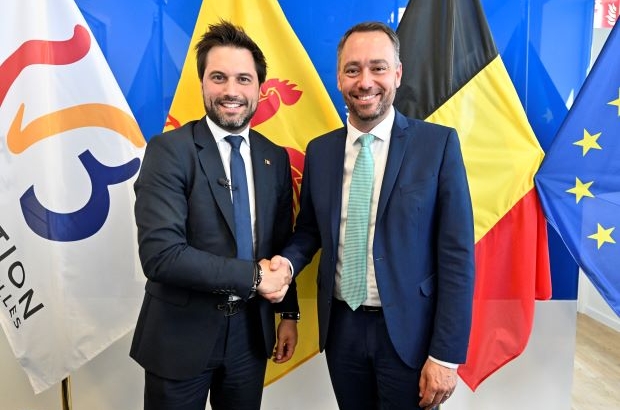- Daily & Weekly newsletters
- Buy & download The Bulletin
- Comment on our articles
Walloon Region: MR and Les Engagés kick off talks to form new government
Two days after Belgium’s triple elections on 9 June, the francophone liberal Mouvement Réformateur (MR) and centrist Les Engagés are the first parties out of the blocks in the race to form new governments.
The two winners in the south of the country, MR (26 seats) and Les Engagés (17), now enjoy a comfortable majority in the Walloon Parliament, possessing 43 out of 75 seats available. The socialists (PS), which have been in power for decades, have accepted that they now become an opposition party with 19 seats.
In a joint press conference on Tuesday, MR leader Georges-Louis Bouchez and his Les Engagés counterpart Maxime Prévot, set out their ambition to discuss forming a coalition in Wallonia, as well as in the Wallonia-Brussels Federation and the Brussels Region. They will need to find other partners, though, to form majorities for the latter two.
Points of agreement
But coalition talks are not only about majorities. Aligning their parties’ political programmes is often a thornier issue. MR and Les Engagés already share many compatible areas, which augur well for a future Walloon government agreement, reports RTBF.
One of MR’s key campaign promises centred on economic reform, and Les Engagés share a similar desire to exercise constraint over public finances. The two parties also propose reducing the number of ministers and parliamentarians, although only Les Engagés favour cutting MPs’ salaries.
In terms of employment policy, both parties are more or less in agreement to set a time limit on unemployment benefits, although this is currently a federal competence, not a regional one. They share a similar aim to support the self-employed while reforming the region’s unemployment agency Forem. “There must certainly be an increase in training in partnership with the private sector, which is certainly more efficient and which has the best machines, the best tools and the best people to carry out this training”, newly-elected Les Engagés MP Olivier de Wasseige told RTBF on Tuesday.
On the question of mobility, the two parties are not in favour of limiting motorway speed to 100 km/h, although only Les Engagés prefer to maintain the 120 km/h limit. Both are expected to agree on how to encourage households to purchase electric vehicles.
Both parties are against the taxation of second residences, and have similar points of view on the reform of inheritance taxes. They also want to create more childcare places.
Points of disagreement
The various issues where MR and Les Engagés are currently not in agreement are the creation of social housing, the question of free buses for young people and the deposit on drink cans, for example.
They also differ on the question of public aid to be granted to businesses. For Les Engagés, aid must only be granted to companies that reduce their carbon footprint.
They also disagree on the question of "stopping concrete" and the question of whether to continue to increase urban development in Wallonia.
Time frame for discussions
The two parties appear to be motivated to move forward quickly with coalition talks and are probably keen to nail down an agreement before the 21 July national holiday. With municipal elections looming on 13 October, both parties will want to show electors that they can start delivering on their promises.
But negotiations for forming the various governments all take place in parallel, with the additional risk that one set of talks could disrupt or jeopardise another.
Meanwhile, the MR leader, whose party came third in Sunday’s federal elections, has already said that he would consider teaming up with the Flemish nationalists N-VA. Under Bart De Wever, the party was the outright winner, with separatist Vlaams Belang in second.
Photo: Georges-Louis Bouchez (MR) and Maxime Prévot (Les Engagés) ©Belga/Eric Lalmand



















